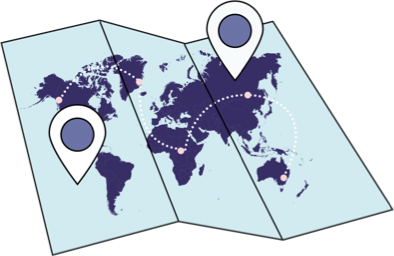Paradise lost
How overtourism both consumes and nourishes Malta's fragile economy
On a square in the busy seaside town of Bugibba, a towering building, squeezed between a tourist shop and a McDonald’s, points towards the sky like a middle finger. A nondescript beach stretches nearby, and, seeing the sun, British tourists strip to T-shirts even in the middle of a windy Mediterranean winter. If they wish, they can easily find a full English breakfast and watch their favourite football team play.
Tourism does not have to look like this and Malta’s government is determined to make it more heritage-oriented. However, its efforts and the archipelago’s attractive location have increased tourist numbers to the point that even hoteliers sound alarm bells.
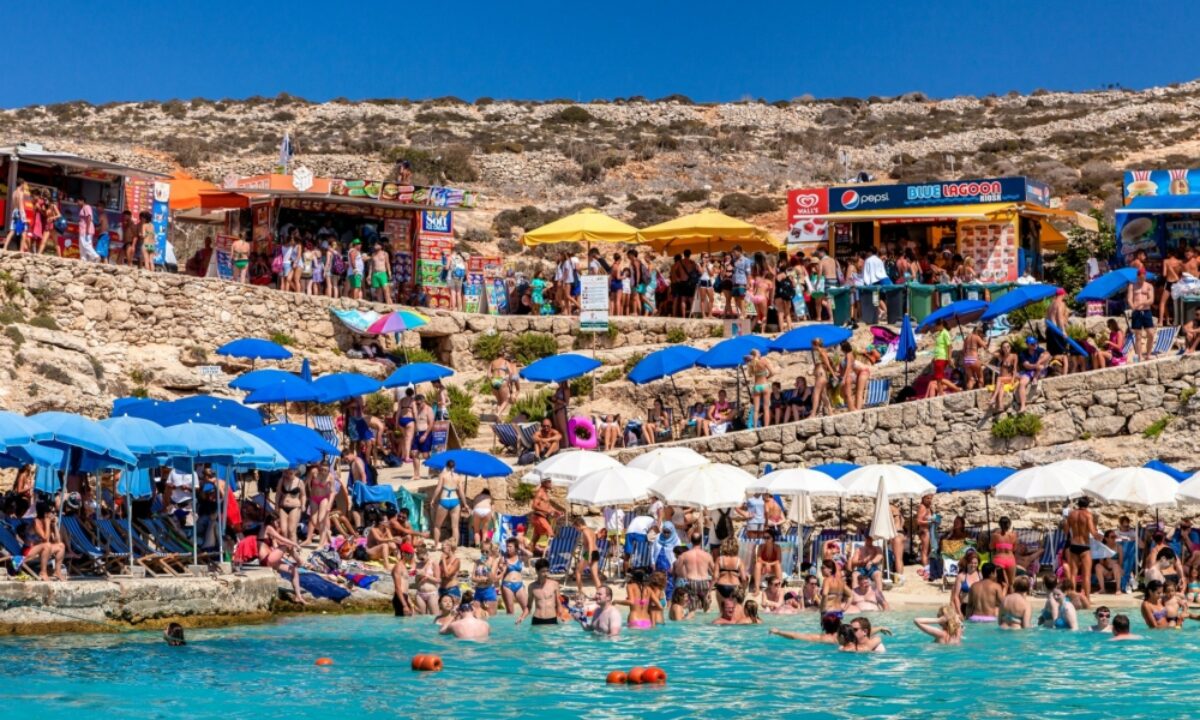
Overcrowding in Comino Island, Malta
Malta’s 500,000 inhabitants are joined by 2.8 million tourists annually, staying an average of seven nights and spilling into streets, buses, ferries, apartments (rental accommodation is routinely lost to AirBnB), and beaches. As the Maltese government points out in its National Tourism Strategy 2015-2020, the country’s sandy beaches are among the most densely used in the world.
Malta’s towns, whose cityscapes were once dominated by limestone churches, are increasingly populated by structures like the tower in Bugibba, monuments to landowners' profiteering. As many tourists shun architecturally dull seaside resorts in search of the ‘authentic’ and the ‘quaint’, boutique hotels have become the talk of the town.
Niche and boutique
Malta’s baroque capital Valletta is a delight for tourists – pedestrian-friendly and full of elaborate churches, cute cafes and picturesque rows of colourful wooden balconies. When Kurt, who grew up in Valletta, inherited his father’s leather and costume shop near St Dominic’s church, he joined the transformation of his city into a service hub.
“I have worked in a factory since I turned 18, but the factory closed down. When my father passed away, I decided to change his shop. I wish I had learnt my father’s trade, but I didn’t,” he explains. Over months, Kurt and his family transformed the shop to sell Maltese street food and brought the island’s ubiquitous local fast food chain, ‘Jeff’s’, into Valletta.
In the morning, the shop is surrounded by locals conversing before work. In the afternoon, it becomes a tourist attraction. “[Tourists] like pastizzi [layered dough pasties with peas or ricotta], but they don’t want to spend too much – my shop is exactly for them,” Kurt says, with pride.
The number of tourists to Malta has doubled over the past decade, but their spending slightly decreased and is now at €807 per tourist. For hotels, the five-star hotel segment shrunk last year and had to lower prices, while three-star hotels enjoyed growth. Tourists complain about excessive prices of fine dining, and more opt for street food that costs pennies and comes with a unique cultural experience. This trend democratises tourism, but it means smaller financial injections into the archipelago’s economy, while the number of people sharing its infrastructure constantly grows.
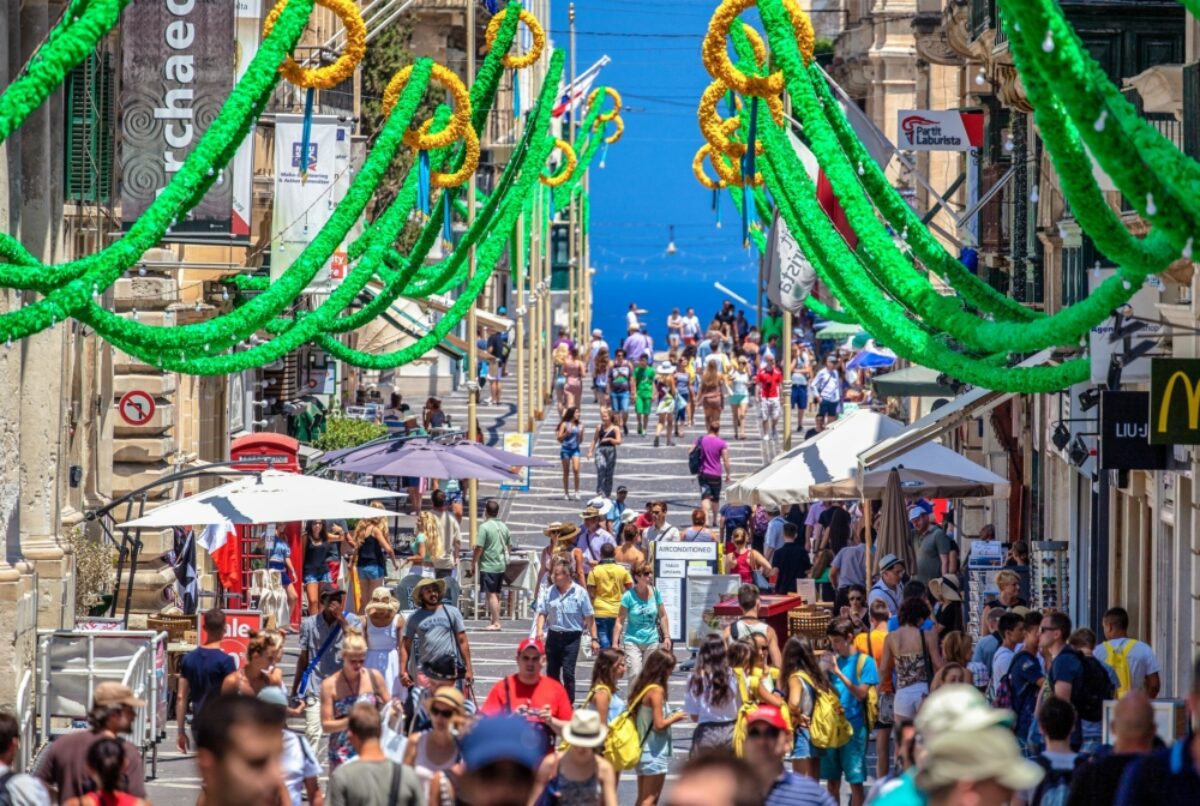
People on the streets of Valletta
Valletta was always a compulsory stop on the tourist route, but it is only over the past decade that the tiny peninsula city became a place for outdoor wining and dining. In turn, more visitors would rather sleep here than commute from less impressive resort towns. Yet Valletta, a protected heritage site, has no space for large hotels to accommodate the demand. The capital hosts 5% of the country’s AirBnB listings, but only 1% of residents. While the island’s population has soared over the past decade, Valletta lost every sixth resident between 2009 and 2019. Tourism can only expand by encroaching on other forms of life, prompting numerous discussions about gentrification. “An ‘invaded neighbourhood’ is someone else’s ‘job opportunity’,” Tony Zahra, president of the Malta Hotels and Restaurants Association, reminded me at a discussion on over-tourism.
As tourists seek a fresh angle for their Instagram photos, Laxmi and her colleague wheel a cart of bed sheets from one of the capital’s boutique hotels to a storage room up the street. To do this work, Laxmi, from Kathmandu in Nepal, has travelled further than most tourists, but it was only recently that she got to explore Malta’s tourist side herself. “Summer is busy, tourists come. Only in winter [do] we have time,” she tells me. “Our work is really hard, and we’re tired. Sometimes [we go out] once a week, not every day. In winter, we have two days off. In summer, sometimes [we need to spend] seven days working.”
Malta’s tourism boom is hungry for workers like Laxmi. Tourists spent 19 million nights in Malta in 2019, creating over 6,000 full-time and 2,500 part-time jobs in the accommodation sector. Yet despite drawing in numerous workers from Nepal, India, the Philippines and elsewhere, tourism offers less to refugees and more vulnerable migrants who, instead of paying employment agencies, made the perilous Mediterranean crossing.
“Disregarding their previous professional experience, hotel jobs are the easiest to get but are not always well paid, with an intense workload,” says Natalia Padron, who ran the Migrant Skills Register, a job-matching initiative for African migrants. Although the unemployment rate in Malta is only around 3% and there seem to be jobs for everyone, migrant job seekers find that, according to Padron, “when it comes to the team, the level of acceptance is lower, so it causes discrimination problems on a daily basis.”
Carrying capacity
Laxmi’s family had to raise 8,000 euros for her agency fee and travel, and critics say that Malta’s economy is exploiting workers like her. Sharing an apartment with four other people, Laxmi does not complain. She came to Malta with a specific project in mind – to gain experience, to learn how to work in a diverse environment and handle foreign visitors, and to save money to invest in her own shop, currently managed by her father. “Here, I am mature, I have a job, I save some money,” she says. “I am very strong now. I know everything. I got used to the country. It’s good now,” she smiles.
When Laxmi collects a replacement of sheets, they are crisp and snow-white. Attention to even the smallest of details of the overall tourist experience is encouraged by the government. However, while each boutique hotel might seem unique to its visitors and team, modern Valletta is not designed for numerous tourist establishments, with the daily washing of sheets, and hundreds of guests taking several showers a day when the weather gets hot.
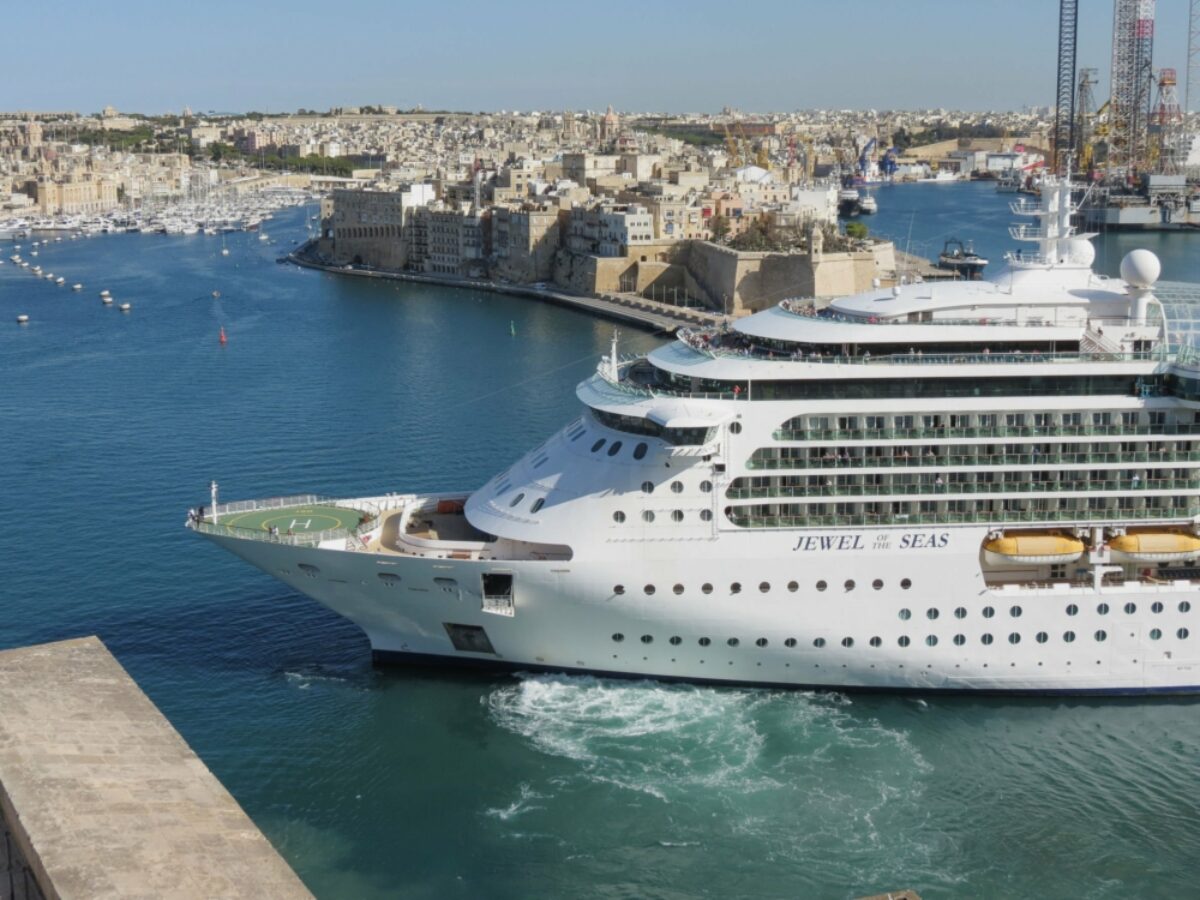
Cruise ship leaving Valletta's harbour, Malta
In a discussion paper published in 2013, geography teacher Eman Mangion calculated that in summer, an average tourist needs around 345 litres of water a day for personal hygiene, pools, spas and other activities. A tourist’s personal water use is double that of a resident’s average water needs in any season.
Malta is one of the most water-scarce countries in the world, but Mangion’s survey showed that tourists are oblivious to this. Over half of the water consumed in Malta comes from three desalination plants, which remove salts from seawater in a costly process. From a consumer’s point of view, the water supply is smooth. But it is expensive and environmentally devastating.
Tourism experts and the media are alarmed – tourism benefits Malta, but how much is too much?
“Commodification is destroying the very fabric that tourists come to enjoy,” warned tourism researcher George Cassar, speaking at a conference in June 2018.
“It is an illusion to believe that niche quality tourism can coexist with mass tourism. In a small, overpopulated destination, they are mutually exclusive,” former bank executive and Times of Malta columnist John Cassar White wrote. ‘Carrying capacity’ has become a catchphrase. In a paper from 2019, University of Malta researchers Lino Briguglio and Marie Avelino presented results of a survey (not representative), showing that only two in five responding residents wanted to see more tourists, and even fewer wanted more hotels in their locality. Still, over two-thirds appreciated the income and employment generated by tourism.
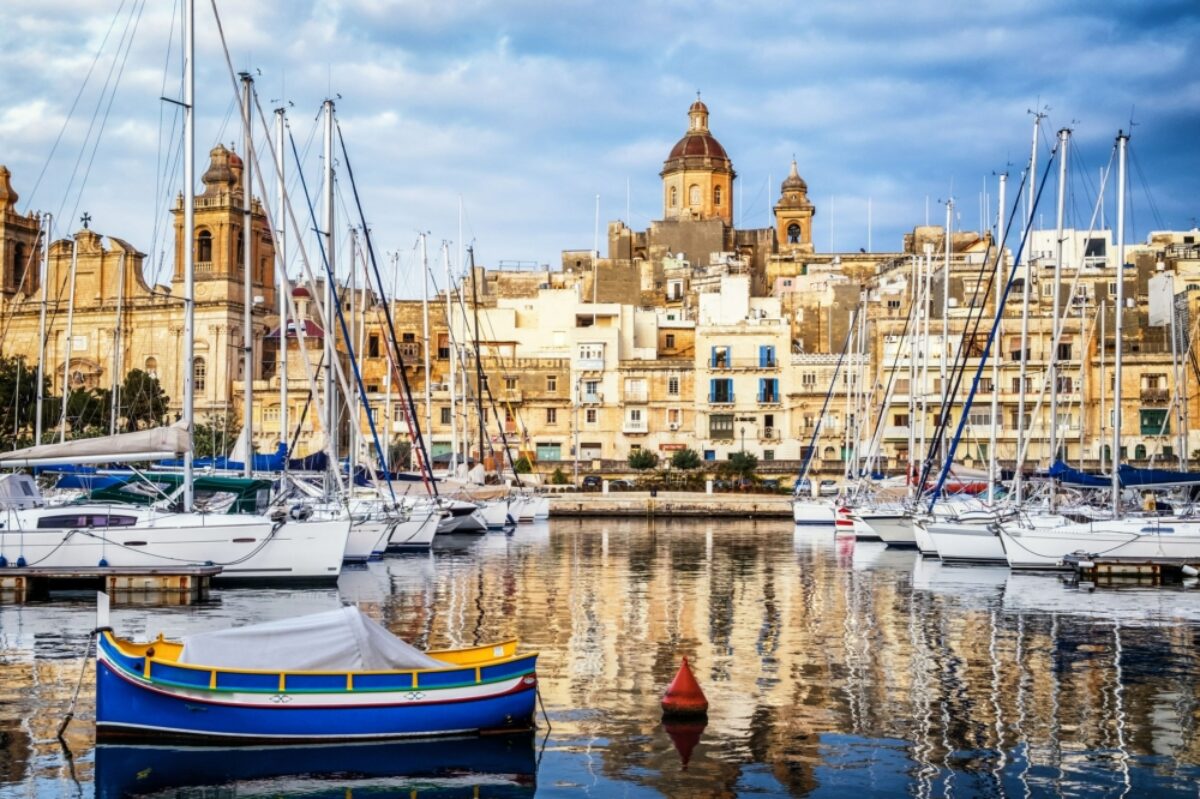
Valletta harbour, Malta
The government’s efforts to attract tourists that it calls ‘novelty seekers’ and ‘culture enthusiasts’ has added to sun-and-sea tourism rather than replaced it. In addition to cheap air travel, which transformed access to the once-expensive Mediterranean destination, Malta received 359 cruise liner calls in 2019, with more than 2,000 passengers per vessel.
For the love of the sea
Cruise passengers are just about the only type of tourists that Marthese, who works in a family business, doesn’t appreciate. “They only stop for one hour,” she regrets. Her home, a once-peaceful fishing village of Marsaxlokk, has been profoundly reshaped. A once-famous local fish market is now full of vendors offering nougat and aprons with Maltese recipes, along with headphones, sunglasses and souvenirs. The quay is lined with restaurants. On Sundays, market-goers and delivery vehicles create traffic congestion. Yet for Marthese, who comes from a fishing family, tourism is what sustains rather than threatens her family’s cherished traditional lifestyle.
As Marthese speaks in her spacious family home, her eyes sparkle as she remembers fishing and shrimping trips with her loved ones. “You feel the water on you, when you see the fish coming. Even the technique – I really enjoy it. And when you see the net coming empty...” She laughs. Last year her brother, a full-time fisherman, caught only two boxes of dolphin fish at the height of the season. This and similar shocks have pushed the family to look for a plan B.
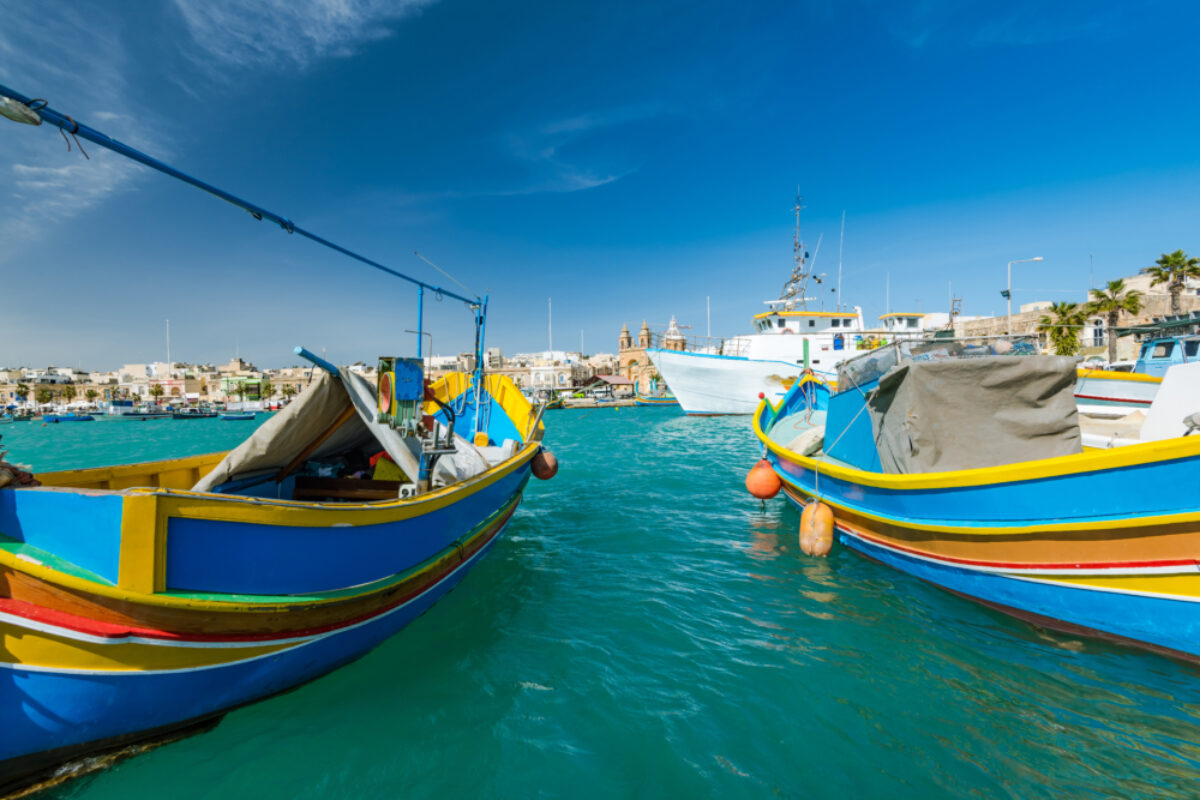
Fishing village of Marsaxlokk
Fisherfolk are on the brink of extinction in the archipelago, which once took pride in its large fishing fleet. Counting 750 full-timers, 633 part-timers in fisheries and aquaculture, the sector is now mostly about fish farms and large-scale commercial fishing. To prevent overfishing, fisher families must apply for strict quotas. The family business Marthese and her husband Joe run was left without a permit to catch tuna, which is among the most profitable. When Joe fell ill and was unable to fish for two months, this further depleted their quota.
Joe disagrees that the quota regulations he has to abide by protect marine environments. “They say you’re ruining the flora underneath. The thing is, the way we did it, it grows back again, you’re only cutting it. It’s like a tree.” His deeply tanned face beams when he thinks of his first memory – helping with shrimps at the age of two or three. Yet his family’s usual locations are now bare due to pollution and overfishing. “The problem is, we used to go first with the bottom nets until May, then we [would] start on the lines, after that we [would] go for whitebaits – so you’re giving [the ecosystem] a chance to live. Then you go after lampuki [dolphin fish]. So you got something all the time. Now, whoever is fishing for red snappers, they go after [them] all year round. That’s why [the population] goes down. And there’s no law to stop it.”
With the tribulations of small-scale fishing weighing down on their family business, Joe and Marthese decided to venture into tourism. They bought a standard tourist boat and then a traditional painted Maltese boat, called luzzu, to carry tourists to popular swimming spots in the south of the island. Joe took a course and blended his newly found knowledge with the numerous stories passed on in the family. Marthese remembered the skills she developed in her first job as a salesperson and took to selling tickets on the shore. “You have to be good at marketing. Sometimes to convince people to come with you takes about 10 minutes,” she says, taking delight in her skill to help tourists discover lesser-known bays. It gives her joy when tourists return, or when they leave a positive comment on TripAdvisor.
After putting away printed graphs she is preparing to show at an event to discuss fisheries in Brussels, Marthese shows a photo of her little grandson in her father’s boat – four sea-loving generations sustained by a newly found opportunity to take visitors on rides in the sea. For her, Joe, Laxmi, and many others, the voracious machine that is tourism nourishes their fragile lifestyles.


